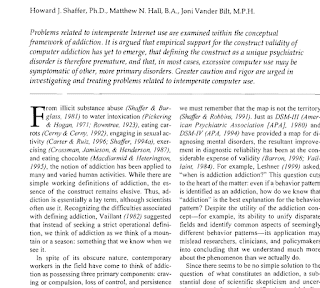Computer addiction can be described as the excessive or compulsive use of the computer which persists despite serious negative consequences for personal, social, or occupational function. Another clear conceptualization is made by Block, who stated that "Conceptually, the diagnosis is a compulsive-impulsive spectrum disorder that involves online and/or offline computer usage and consists of at least three subtypes: excessive gaming, sexual preoccupations, and e-mail/text messaging". While it was expected that this new type of addiction would find a place under the compulsive disorders in the DSM-5, the current edition of the Diagnostic and Statistical Manual of Mental Disorders, it is still counted as an unofficial disorder. The concept of computer addiction is broadly divided in two types, namely offline computer addiction and online computer addiction. The term offline computer addiction is normally used when speaking about excessive gaming behavior, which can be practiced both offline and online. Online computer addiction, also known as Internet addiction, gets more attention in general from scientific research than offline computer addiction, mainly because most cases of computer addiction are related to the excessive use of the Internet.
Although addiction is usually used to describe dependence on substances, addiction can also be used to describe pathological Internet use. Experts on Internet addiction have described this syndrome as an individual being intensely working on the Internet, prolonged use of the Internet, uncontrollable use of the Internet, unable to use the Internet with efficient time, not being interested in the outside world, not spending time with people from the outside world, and an increase in their loneliness and dejection. However, simply working long hours on the computer does not necessarily mean someone is addicted.
Symptoms

- Being drawn by the computer as soon as one wakes up and before one goes to bed.
- Replacing old hobbies with excessive use of the computer and using the computer as one's primary source of entertainment and procrastination.
- Lacking physical exercise and/or outdoor exposure because of constant use of the computer, which could contribute to many health problems such as obesity.
Effects

Excessive computer use may result in, or occur with:
- Lack of face to face social interaction.
for more computer health problems see computer vision syndrome
Causes

Types

Treatment

Origin of the term and history

British e-learning academic Nicholas Rushby suggested in his 1979 book, An Introduction to Educational Computing, that people can be addicted to computers and suffer withdrawal symptoms. The term was also used by M. Shotton in 1989 in her book Computer Addiction. However, Shotton concludes in her book that the 'addicts' are not truly addicted. Dependency on computers, she argues, is better understood as a challenging and exiting pastime that can also lead to a professional career in the field. Computers do not turn gregarious, extroverted people into recluses; instead they offer introverts a source of inspiration, excitement and intellectual stimulation. Shotton's work seriously questions the legitimacy of the claim that computers cause addiction.
The term became more widespread with the explosive growth of the Internet, as well the availability of the personal computer. Computers and the Internet both started to take shape as a personal and comfortable medium which could be used by anyone who wanted to make use of it. With that explosive growth of individuals making use of PCs and the Internet, the question started to arise whether or not misuse or excessive use of these new technologies could be possible as well. It was hypothesized that, like any technology aimed specifically at human consumption and use, that abuse could have severe consequences for the individual in the short term and for the society in the long term. In the late nineties people who made use of PCs and the internet where already referred to the term webaholics or cyberholics. Pratarelli et al. suggested at that point already to label "a cluster of behaviors potentially causing problems" as computer or Internet addiction.
Computer addiction was used as an effective defence by one of the defendants in the Eight Legged Groove Machine hacking trial in the 1993. The victims allegedly caused £120,00 worth of damage to JANET, BT, Financial Times, European Commission sites. Expert psychiatric evidence of obsessive addiction to hacking. Held - defendant was "addicted to hacking", and lacked criminal intent. Defendant acquitted.
There are other examples of computer overuse that date back to the earliest computer games. Many NetNews users were considered obsessive in the 1980s. Press reports have furthermore noted that some Finnish Defence Forces conscripts were not mature enough to meet the demands of military life, and were required to interrupt or postpone military service for a year. One reported source of the lack of needed social skills is overuse of computer games or the Internet. Forbes termed this overuse "Web fixations", and stated that they were responsible for 12 such interruptions or deferrals over the 5 years from 2000â€"2005.
See also

- Computer rage
- Digital addict
- Underearners Anonymous
- Video game addiction
References
Works cited
